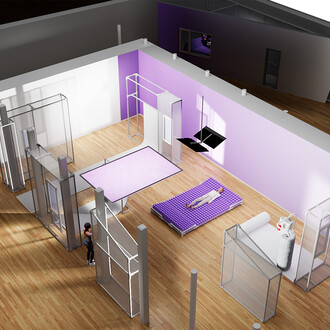New York–based photographer David Levinthal uses staged photographs of toys and other everyday objects to bring viewers face-to-face with themes central to American history, identity, and consciousness. David Levinthal: Photographs 1972–2016 provides a rich overview of the artist’s work.
Through the iconography of mass-produced toys, dolls, and figurines, Levinthal’s photographs have probed the myth of the American West; World War II and the Holocaust; romantic and sexual desire; racial stereotyping; the heroism of sport; and the futuristic fantasy of space exploration. The images range from intimately scaled prints, to large 20-by-24-inch Polaroids, to monumental inkjet prints.
Evoking the visual language of photojournalism, pornography, television, film, and religious art, the photographs elicit a response not to the actual moment or event or object, but to the place it holds in a collective American consciousness. For example, Levinthal (born 1949) said that the images in his “Wild West” series depict “the West that never was but will always be.”
David Levinthal: Photographs 1972–2016 celebrates a gift to the MFAH of 44 Levinthal works. Donated by Donald Rosenfeld, John A. MacMahon, and an anonymous donor, the photographs are on view alongside a selection of Levinthal images already held by the Museum. The exhibition presents a chronological look at the artist’s major series: “Bad Barbie,” “Hitler Moves East,” “Modern Romance,” “Wild West,” “American Beauties,” “Space,” “Passion,” “Mein Kampf,” “Blackface,” “Baseball,” “XXX,” “Netsuke,” and “Hockey.”
















